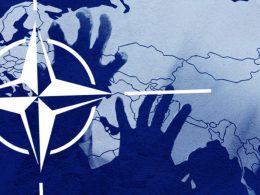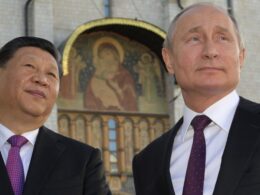In the last two years, the world has experienced developments that have created a mandate for new additions to revolutionary thought. We’ve gotten more information about our task, information that tells us who exactly the cause’s friends and foes are. With the escalations of the Donbass and Palestine conflicts—which truly are genocides that the targets have been fighting back against—we’ve been told so many things about the future of the class struggle.
The central lesson among these is that at this stage in the struggle, the most important point of unity is over whether a given person supports the fight against U.S. hegemony. Something similar to this happened during the first and second world wars. Amid those conflicts, many socialists and non-socialists were able to find a common interest when it came to combating imperialism and fascism. There were opportunistic socialists who supported World War I; and people who weren’t socialists, but took the same stance on the war as the socialists who were anti-imperialist. There were rightists and liberals during World War II who shared the desire of the pro-Soviet communists to defeat Nazism; as well as “socialists” of the Orwell and Trotsky varieties kept attacking the Soviet Union, even though this helped the Nazis. The equivalent type of polarization has emerged today, during a moment when imperialism has brought its wars to another historical peak in intensity.
The essence of the way that today’s socialists have come to diverge is not over whether the genocide against Palestine should be opposed; every socialist who isn’t an outright Bernie Sanders social fascist has been able to agree that Israel is not waging a just war. The divide we’ve seen arise among socialists emerged almost two years earlier than when the Palestinian resistance carried out its pivotal operation this October. After February of last year, when Russia began its operation to halt the Ukrainian fascist regime’s genocide against the Donbass, some socialists supported Operation Z while others disavowed it. More accurately, the overwhelming majority of global communists supported it, while the insular and ineffectual socialist orgs within the imperialist countries took the anti-Z stance.
Throughout the next year, the types of socialists within the imperialist countries who share the pro-Russian position built alliances with the only other types of antiwar groups who are willing to assist them. Those being the groups that aren’t on the left, and therefore don’t have the investment in liberal opportunism which today’s dominant iterations of “leftism” share. Even though non-left antiwar coalition partners like the Libertarian Party haven’t stated support for Russia, they have shown themselves to be infinitely more committed to resisting U.S. hegemony than the anti-Russian socialists have. This is because unlike those compromised kinds of socialists, their goal is not to tail liberals but to build an effective antiwar movement.
To see why libertarians have been willing to align with the pro-Russian communists, while the anti-Russian socialists haven’t, simply look at where their material interests are. The libertarians have a real reason to want to see U.S. hegemony defeated; they have a material interest in ending the misuse of their tax dollars for military adventures, the national security state that’s destroying their liberties, and the domination of our government by monopoly capitalist industries like defense contractors and big pharma. (I’m speaking of the libertarians who’ve committed to the antiwar cause, not of the neocons who like to use the “libertarian” label.) They represent the old strain of conservatives who hate war, as opposed to the cynical types of leftists who’ve been increasingly abandoning the antiwar cause.
In their efforts to accomplish these goals, they’re not held back by the influence of the Democratic Party, because they lack a connection to the “left.” And simply due to having this ideological independence from the circles the liberals control, the libertarian movement has lately been able to do things the established left groups would never do, like break ties with financial backers. In part because of the committedly antiwar stance that the Libertarian Party’s leadership has taken, wherein the org has gone in a more illiberal direction, the party’s former big donors have decided to stop funding it.
The imperialism-compatible left is not capable of initiating such a split with the liberals it depends on, because it’s too ideologically bankrupt to have that kind of flexibility. Whereas the ideological predecessors to the libertarian movement are those early 20th century conservatives who opposed World War I and fascism, the predecessors to today’s “left” are the anti-Soviet socialists and the “Marxist” defenders of imperialist wars. Whereas the former element had its own source of material backing in the lower levels of capital, and therefore has been independent from capital’s highest levels, monopoly finance capital has been the backer of the latter. Trotsky, Orwell, and their modern equivalents within places like BreadTube have depended on support from the intelligence agencies in order to maintain prominence.
I can see a role for the anti-imperialist libertarians in the productive workings of a post-revolutionary society. The ones who have businesses could take on the equivalent role to the petty capitalists who had a place in China’s revolution, and have their companies benefit from our society becoming part of the Belt and Road Initiative. The only role I can imagine for the committed imperialism-compatible leftists after our society has progressed is one where they take on a fully reactionary role, acting as “left” dissidents in the vein of the ones China has. Should the anti-imperialist movement succeed, they’ll be among the elements fighting to impede or reverse the revolution’s progress. Even many people who aren’t communists would still be compatible with market socialism. The compatible leftists are only going to point to such markets as supposed evidence that it isn’t “real” socialism, among the countless other reasons they may find to say so.
As Parenti assessed, the pure socialists support every revolution besides the ones that succeed. This will apply to how these elements of the left act about Palestine after it defeats Zionism, and we already have a sense for that in the way they’ve reacted to the comparable situation within Donbass. Fascist Ukraine had been bombing civilians as a strategy for eight years up till when the special operation started. It was creating mass graves, humanitarian crises, and mass amputations, like how the Israelis have been doing in Gaza. Then when the Russian people managed to overcome their bourgeois government’s complacency, and mobilize to the defense of these communities, even some of the same western communist orgs that had recognized Kiev’s crimes refused to back the operation.
The only reason why these orgs have supported Palestine’s Operation Al-Aqsa Flood is because Palestine is weak for the time being. Should the Palestinians do what the people of the DPRK have done, and overcome genocidal warfare to build their own socialist society, the attitude towards them among the western left will change. Like how the DPRK’s pro-Russian argument has been dismissed by the western left, at a certain point Palestine’s revolution is going to become too beneficial towards anti-imperialism for the State Department socialists to want to align with it anymore. They’re supporting it today because they don’t see it as a threat, but inevitably it’s going to take on the same highly multipolar role that Korea’s revolution has, and then they’ll come into conflict with it.
The solidarity from these actors ends as soon as the counter-hegemonic forces become truly able to win. This is shown by the efforts of these actors to undo the progress which Washington’s challengers have made towards building a post-American world, wherein the western left seeks to create wedges between the different anti-imperialist countries. They’ve been trying to separate Russia from Africa, they hope to do the same with China, and ultimately they’ll try to do so with Palestine.
When an ideological element’s ultimate interests are not in advancing progress, but in monopolizing an activist and discourse sphere, this element is never going to run out of reasons to fight against the unification of anti-imperialists. This is the goal of the intelligence centers that are driving these movement sabotage efforts: to perpetuate instability and uncertainty among the forces that are capable of defeating monopoly capital. We must resist their attempts to create distrust between the countries, ideological groups, and individuals that oppose the hegemon. The new cold war has created a political realignment where many elements that used to seem irreconcilable have been able to come together on anti-imperialism, and we need to take advantage of the opportunity this represents for advancing the struggle.
————————————————————————
If you appreciate my work, I hope you become a one-time or regular donor to my Patreon account. Like most of us, I’m feeling the economic pressures amid late-stage capitalism, and I need money to keep fighting for a new system that works for all of us. Go to my Patreon here.
To keep this platform effective amid the censorship against dissenting voices, join my Telegram channel.








